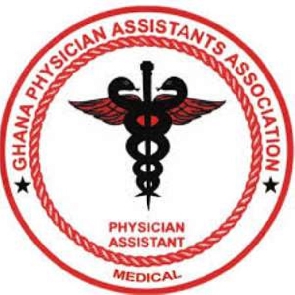 Ghana Physician Assistants Association's logo
Ghana Physician Assistants Association's logo
Casting your mind back into the history of this country, one could remember when it took a week or more before we saw the next car back in our villages or when important messages could be sent to loved ones by only limited words via telegram or perhaps you would remember the times when telephone communication was through landlines up until when phonebooths became common.
Owning a mobitel in the early ninety's was for the wealthy class. Have you wondered how healthcare was then? Remember how difficult it was for one to reach the nearest hospital in emergencies?
It is against this background that the Physician Assistant profession was introduced, which was a timely intervention to reduce morbidity and mortality in the country.
The physician Assistant profession, formerly called Medical Assistant started in the year 1969, 12 years after Ghana attained independence when the medical workforce was identified to be very low with a widened gap in patient-to-doctor ratio and uneven distribution of health professionals and facilities across the country. More to it was the poor nature of the road network with a lack of communication systems at the time except for a few privileged individuals in the country who could afford it.
It was realized then the urgent need to adopt this model of the profession to reach the poor and underserved communities within the country.
The surge to reduce health inequity was augmented by the Alma Atar declaration in 1978 in Kazakhstan by heads of state across the globe to adopt the Primary Health Care concept which aimed at the attainment of universal access to health for all at a cost that the community can afford.
Training
This program was introduced by the Ministry of Health and training began at the then Rural Health Training Centre now called College of Health and Well-being at Kintampo in the year 1969. The basic qualification for admission was registered nursing with a minimum of three years of working experience. The name of the program was Community Medicine and Health, and those who completed were awarded Advanced Diploma in Community Medicine and Health after one year of training.
Kintampo Rural Health Training Centre remained the only school that was in the training of this cadre of professionals, and products were further employed by the Ministry of Health as medical assistants.
The program was reviewed around 2006 to allow direct entry into the program with SSSCE/WASSCE Certification, increasing the years of training to 2 years for the post-basic and 4 years for the direct entry.
In 2010, Central University began the training of Physician Assistants leading to the award of a bachelor of science degree. Following that, other universities adopted and introduced the PA program in their various universities, among which are Presbyterian University, Nar-bita College, Yamfo College of Health, Pentecost University, etc.
It was around this period when the Medical and Dental Council proposed and changed the name from Medical Assistants to Physician Assistants (PA). And in an attempt to harmonise the training and ensure standards, they further introduced a license examination for PAs who have completed the program from all the training institutions. Those who excel in the examination are inducted and allowed to commence their one-year mandatory internship service, following which they are allowed to be registered with the Council as Physician Assistants.
There have been several calls by the PAs and the training institutions for career advancement that will ensure specialisation in the fields of medicine, dentistry, obstetrics and gynecology, surgery, psychiatry, dermatology, etc which the Ministry of Health is yet to heed. With best practices across the globe, it makes no meaning to copy only the name of a program and neglect the structure upon which the name Physician Assistant was built.
Practice and regulation
The profession was formerly regulated by the Nurses and Midwifery Council until about three decades ago when the regulation stopped. In the year 2010, the Medical and Dental Council took up the training and regulation of the PA profession under section 6 of ACT 857 of the Health Profession Regulatory Act with the mandate to train and regulate the practice of medicine and dentistry in the country and has since remained the regulator.
Over the years, the profession has enjoyed the effective supervision of the internal structures instituted by the Ministry of Health and the Employer, which ensures that professionals operate within a defined job description and code of conduct. The PA is therefore directly responsible to his/her District/Municipal Director or Medical Director of a hospital or Polyclinic.
With over a thousand health centers across the country manned by physician assistants, they take charge of ensuring a productive workforce of staff assigned to their facilities, manage and mobilize funds, carry out public health roles, embark on monitoring and supervision of activities of CHPS centres within their jurisdiction as well as execute their core clinical duties of taking history and management of patients with various health conditions, referring appropriately where necessary.
They can be found in the remotest area in the country many times with poor and inaccessible road networks and even the majority working under poor conditions with no remuneration. In the last 2 decades, it has been common to meet them also in the consulting rooms of most hospitals and Polyclinics doing due diligence to their core duties of taking history and managing patients with various illnesses.
It is an attributable fact that Physician Assistants are the backbone of primary health care in Ghana, having agreed to work under challenging conditions only to make health accessible to the rural communities, thereby reducing morbidity and mortality and promoting health in the population of this country.